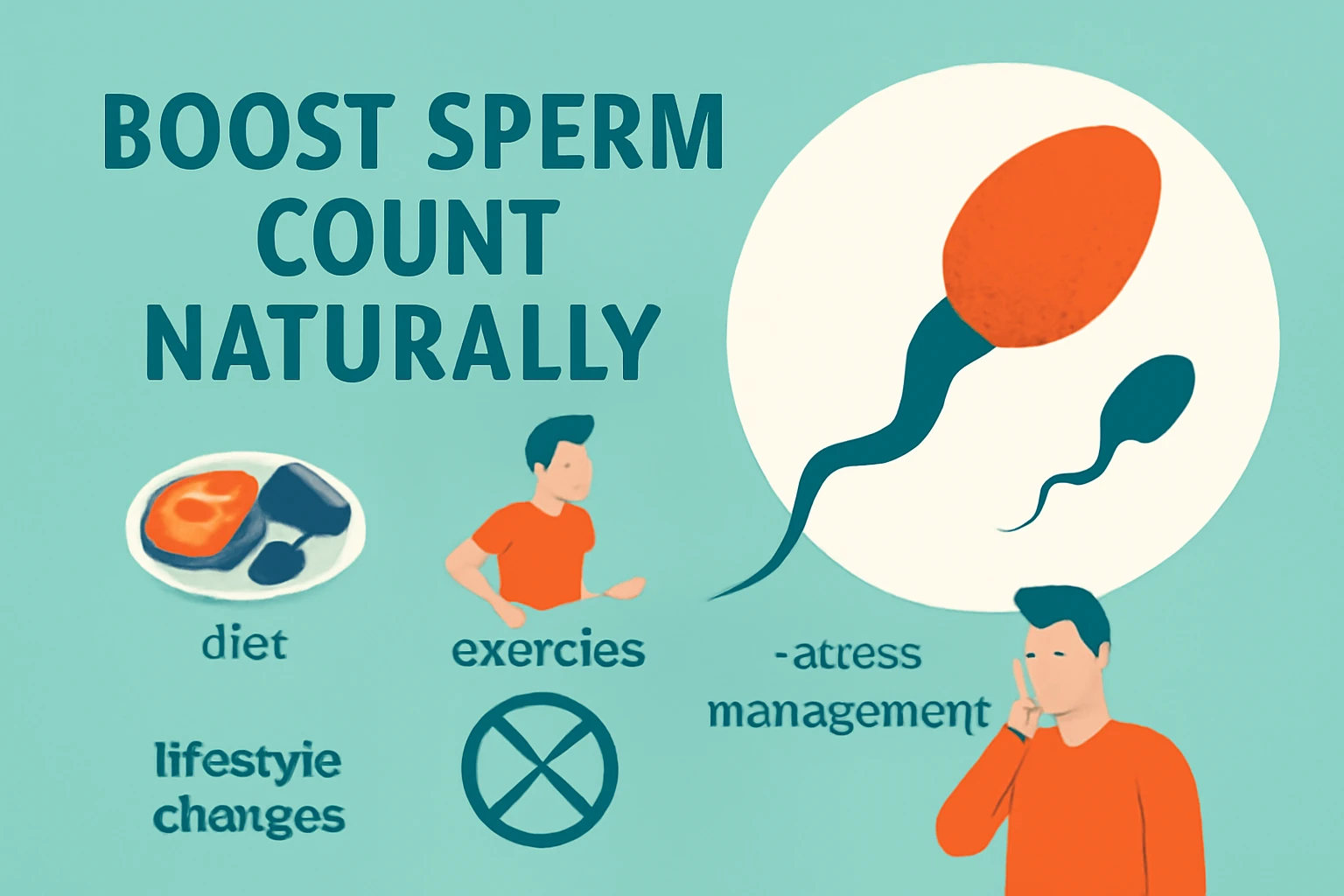Azoospermia is a condition where a man’s semen contains no sperm. It affects about 1% of the male population and can be a heartbreaking diagnosis for couples trying to conceive. However, with recent advancements in medicine and supplements, there is growing hope. One of the most discussed solutions in the early stage of azoospermia is the use of fertility tablets and natural supplements.
In this blog post, we’ll explore everything you need to know about azoospermia, the different types, causes, and the best azoospermia tablets that are helping men around the world reclaim their fertility. Whether you’re newly diagnosed or exploring treatment options, this guide is here to support you on your journey.
1. What Is Azoospermia?
Azoospermia is a medical condition where a man’s semen contains no measurable sperm. This condition is a leading cause of male infertility. Unlike low sperm count (oligospermia), azoospermia is more severe and often requires medical treatment.
Symptoms might not always be obvious. Most men discover they have azoospermia during fertility testing.
2. Types of Azoospermia
There are two main types of azoospermia:
a) Obstructive Azoospermia
This occurs when there is a blockage in the reproductive tract. Sperm is produced in the testicles but cannot be released due to a blockage.
b) Non-obstructive azoospermia
In this case, the body doesn’t produce sperm at all or produces a very minimal amount that doesn’t make it into the semen. It is often due to hormonal imbalances or testicular failure.
3. Causes of Azoospermia
Understanding the cause is key to selecting the best azoospermia tablets and treatment options. Common causes include:
-
Genetic disorders (e.g., Klinefelter syndrome)
-
Hormonal imbalances
-
Undescended testicles
-
Previous surgeries or injuries
-
Infections like mumps
-
Varicocele (enlarged veins in the scrotum)
-
Radiation or chemotherapy
-
Environmental toxins or lifestyle choices like smoking, alcohol, or steroid use
4. How Azoospermia Is Diagnosed
Doctors usually recommend the following tests:
The results help determine whether the condition is obstructive or non-obstructive.
5. Can Azoospermia Be Treated?
Yes, many cases of azoospermia can be treated. The treatment depends on the type and underlying cause. Options include:
-
Surgery (to remove blockages)
-
Hormone therapy
-
Sperm retrieval techniques for IVF
-
Lifestyle changes
-
Supplements and medications
One of the less invasive and often first-line treatments includes the use of fertility-boosting tablets.
6. Role of Tablets in Treating Azoospermia
When it comes to non-obstructive azoospermia, hormonal therapy and supplements may stimulate sperm production. The best azoospermia tablets typically include a combination of:
-
Hormones to balance testosterone or FSH/LH
-
Antioxidants to improve testicular health
-
Amino acids and vitamins that support sperm production
-
Ayurvedic or herbal formulations
These tablets may not work for everyone, but many men have found improved semen quality after consistent use.
7. Top 10 Best Azoospermia Tablets in 2025
Here are the most recommended tablets and supplements for improving sperm production and treating azoospermia:
1. Clomiphene Citrate (Clomid)
A fertility drug that stimulates the brain to increase the release of hormones needed for sperm production. Widely prescribed by fertility doctors.
Pros: Clinically proven, safe in controlled doses
Cons: Prescription-only, possible side effects
2. HCG (Human Chorionic Gonadotropin)
Used in hormonal therapy to stimulate the testicles to produce sperm, especially when testosterone is low.
Pros: Very effective in some non-obstructive cases
Cons: Requires injection, monitored by a specialist
3. Fertilaid for Men
A popular over-the-counter supplement containing zinc, L-carnitine, CoQ10, and antioxidants.
Pros: Natural, no prescription needed
Cons: Results vary by person
4. Proxeed Plus
Clinically tested supplement with L-carnitine, selenium, zinc, and vitamins C and E. Helps improve sperm quality and motility.
Pros: Backed by clinical trials
Cons: Expensive
5. Ayurvedic Tablets – Speman by Himalaya
An herbal supplement from India with ingredients like gokshura and Pikachu.
Pros: Natural, traditionally used in Ayurveda
Cons: Takes time to show results
6. Myo-Inositol and D-Chiro Inositol Tablets
Primarily used for hormonal balance and improving insulin sensitivity, but also effective for sperm health.
Pros: Good for hormonal regulation
Cons: Not specific for azoospermia
7. Ashwagandha Capsules
An adaptogen that improves stress response and testosterone levels, indirectly improving sperm health.
Pros: Natural stress-reliever, supports hormone health
Cons: Results are not instant
8. Zinc and Folic Acid Tablets
Studies show that this combination may improve sperm count and motility when taken regularly.
Pros: Affordable, essential nutrients
Cons: Not effective for severe cases alone
9. Vitamin E and Selenium Tablets
Known for their antioxidant properties, they protect sperm from oxidative damage and improve semen quality.
Pros: Boosts overall reproductive health
Cons: Best used with other supplements
10. Testosterone Boosters (only under supervision)
Supplements like DHEA or bioavailable testosterone can be helpful, but must be used carefully.
Pros: Effective when testosterone is low
Cons: Can reduce fertility if misused
8. Natural Supplements That May Help
Alongside the best azoospermia tablets, many men benefit from including natural fertility boosters in their daily routine:
These supplements are widely available and work by improving blood flow, reducing oxidative stress, and supporting hormonal health.
9. Lifestyle Changes to Support Fertility
No supplement works in isolation. Making healthy lifestyle changes can drastically improve your chances of recovery:
-
Quit smoking and reduce alcohol intake
-
Exercise regularly, but avoid overtraining
-
Maintain a healthy weight
-
Reduce stress with meditation, yoga, or therapy
-
Avoid hot tubs and tight underwear
-
Eat a balanced diet rich in antioxidants, proteins, and healthy fats
10. When to See a Doctor
If you’ve been trying to conceive for over a year without success, consult a fertility specialist. A professional can guide you on the best treatment path, whether that includes hormonal therapy, surgery, or assisted reproductive techniques like IVF or ICSI.
Don’t self-medicate, especially with hormonal drugs. Some tablets may be unsafe if not prescribed based on test results.
11. Final Thoughts
Azoospermia can feel overwhelming, but the condition is not always permanent or untreatable. Thanks to modern science and a growing understanding of male reproductive health, there are now effective solutions available.
The best azoospermia tablets can be a great starting point for treatment, especially in non-obstructive cases. Whether it’s Clomiphene, herbal supplements like Speman, or multivitamin blends like Fertilaid, consistency and medical guidance are key.
Before starting any supplement or medication, get a full evaluation. A personalized approach is always more effective than trying random pills.
Remember, every man’s body is different. What works for one may not work for another, but with hope, persistence, and professional care, you can take back control of your fertility.
FAQs
Q: How long do azoospermia tablets take to work?
A: Most supplements take at least 3–6 months to show noticeable results in semen analysis.
Q: Are there side effects to fertility tablets?
A: Some hormone-based tablets like Clomid or HCG can cause mood swings, acne, or changes in libido. Herbal supplements usually have fewer side effects.
Q: Can azoospermia be cured naturally?
A: In some mild cases caused by hormone imbalance or lifestyle, yes. However, more severe forms may need medical intervention.
Q: Is IVF the only option for azoospermia?
A: Not always. If sperm is present in the testicles but not in semen, it may be retrieved surgically. Tablets may help in less severe cases.






